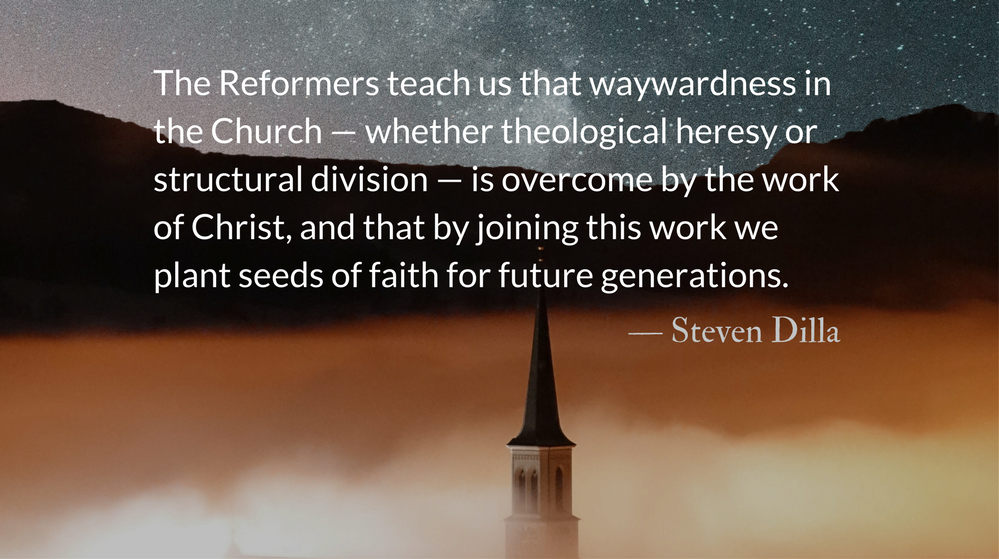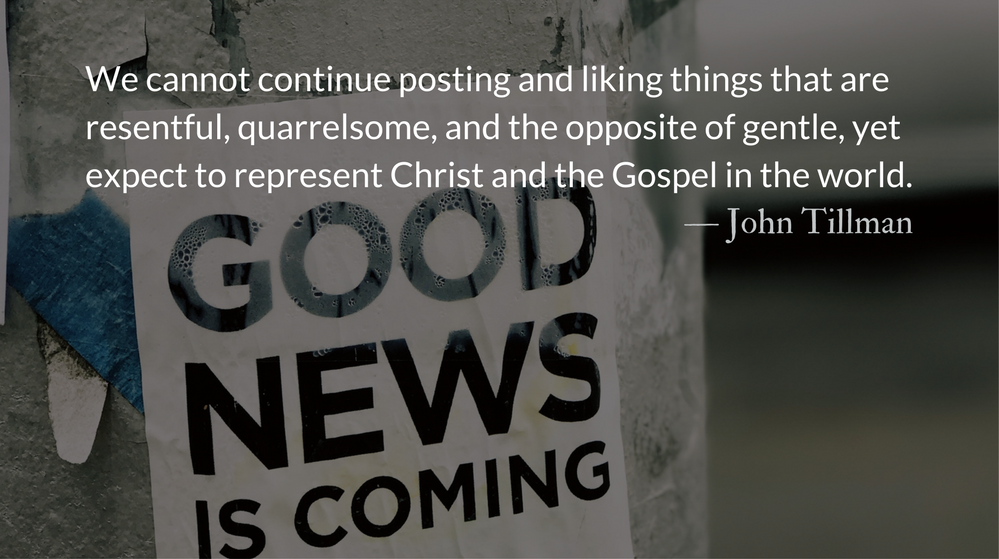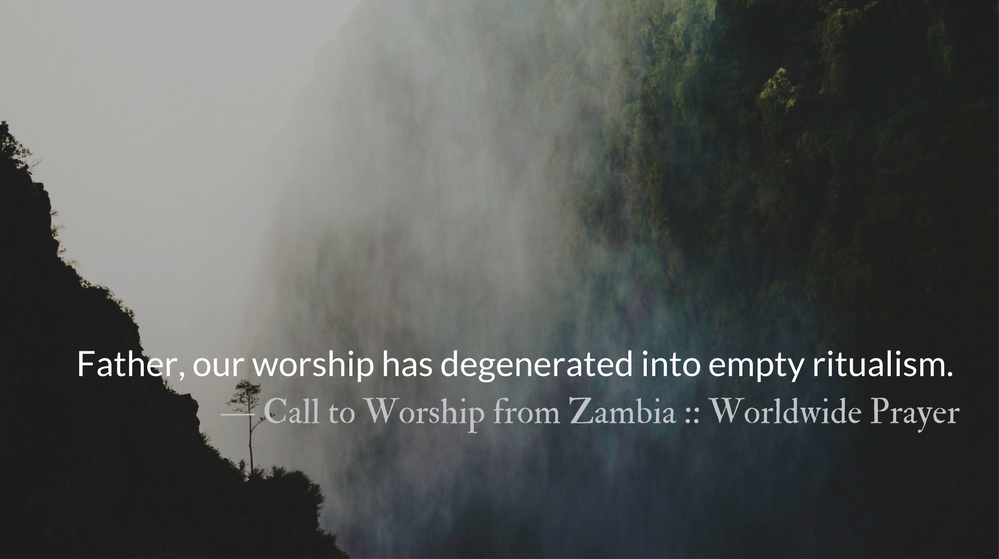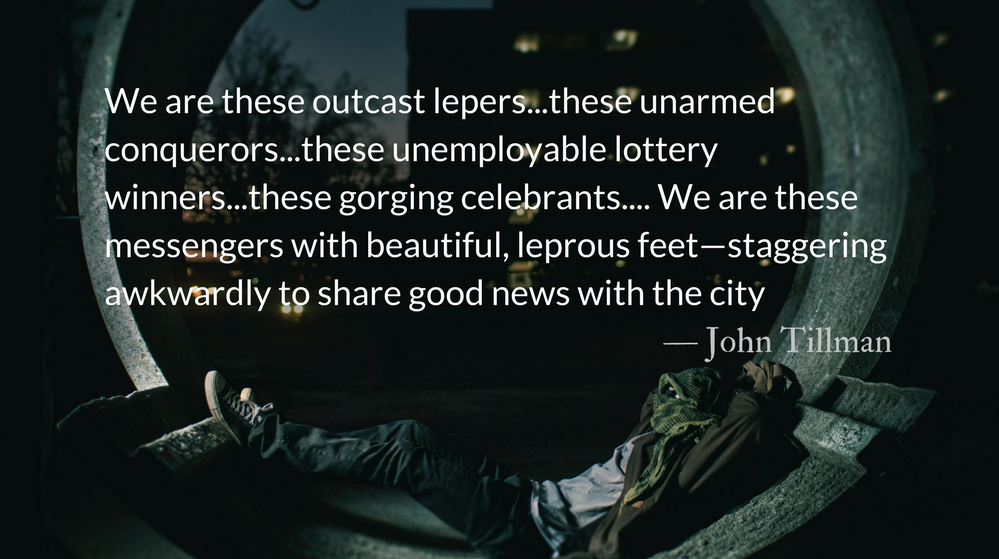Scripture: 2 Timothy 3.14-15
But as for you, continue in what you have learned and have become convinced of, because you know those from whom you learned it, and how from infancy you have known the Holy Scriptures, which are able to make you wise for salvation through faith in Christ Jesus.
Reflection: The Heart of the Reformation
The Park Forum
On October 31, 1517 Martin Luther, then a Catholic Priest, pounded his 95 Theses to the door of All Saints Church in Wittenberg, Germany. Posting topics for debate on the church door was commonplace, and wouldn’t have felt monumental that particular day, but Luther’s confrontation of Catholicism would ultimately spark the Protestant Reformation.
While we want to fasten on the Word, we also want to show how we’re part of a chain in history that goes back, and back, and back. We’re not trying to be so innovative that we’re the first generation to get it all right. — D.A. Carson
Reading the language of Luther, John Calvin, and the other Reformers can be disheartening today. In addition to calling the Pope the “antichrist,” Calvin also hurled names like “pigs,” “riffraff,” and “asses” at his opponents.
“When you read Luther and Calvin, a lot of their polemical statements, a lot of the ways in which they talk about the Papacy, and so-on, you look at them and say, ‘you shouldn’t talk that way,’” concludes Timothy Keller. “But that was a different situation… It was life-and-death.”
The tension of orthodoxy and ecumenicism is the foundation for understanding how the Reformation affects faith today. In an article on the tendency to overuse the label “heretic,” Episcopal Priest Justin Holcomb observes, “We may be tempted to think that since theology so easily divides, we are better off simply agreeing to disagree.”
We must remember that the sum of what Christians should believe is not identical to the essentials we must believe for salvation. We need to leave room for believers to grow in their understanding of the faith. We believe in justification by faith in Christ, not justification by accuracy of doctrine. We are saved by grace, not by intellectual precision. — Justin Holcomb
This doesn’t mean the abandonment of disciplined and thoughtful faith, however. Holcomb reminds, “In order to love God aright, and to be assured of the salvation he offers, we must know who God is and what he has done for us in and through Jesus Christ.”
Modern believers won’t handle the relationship between the Protestant and Catholic Churches the same (even Dr. Keller admits, “I don’t own all that rhetoric”), but we can grow in our understanding of the gospel through the words of the Reformers.
The reason we believe the Reformation is so important is because we think they did get the Bible right. You had a massive movement in which people sought to look at Scripture and find out what the biblical gospel truly was. — Timothy Keller
Integrating the gospel-centrality of the Reformation with a humble and winsome unity with Christians from various theological backgrounds is critical today. And there may be greater opportunity as Protestant support of the Pope soars. For his part, Pope Francis has extended an olive branch. In a letter to Evangelicals and Catholics in Chicago the Pope writes:
We know that the visible unity of the Church is the work and gift of the Holy Spirit, who will bring it about in His time… The division among Christians is the fruit of our sin, and it is a scandal and our greatest impediment for the mission for which the Lord has called us: announcing the Good News of the Gospel.
Today, the blood of the many Christians slaughtered in diverse parts of the world cries out to heaven. The one that persecutes does not make a mistake, he doesn’t ask if they are Catholic, Evangelical, Orthodox… they are Christians, followers of Jesus Christ, and that is enough. This blood challenges us: Do we have the right to make our divisions a priority while the blood of our brothers is shed for the testimony of Jesus Christ?
This is the moment of reconciliation, to accept “the unity in reconciled diversity,” an expression of Oscar Cullman. We know very well what divides us, let us be more strengthened in what unites us: the common faith in Jesus Christ as the only Lord and Savior, the Word of God, and Baptism. — Pope Francis
Luther’s intention wasn’t division, but renewal. The heart of the Reformation is the recovery of the gospel, inside the Church, for the good of the world. The Reformers teach us that waywardness in the Church — whether theological heresy or structural division — is overcome by the work of Christ, and that by joining this work we plant seeds of faith for future generations.
The Request for Presence
Early in the morning I cry out to you, for in your word is my trust. — Psalm 115.1
– From The Divine Hours: Prayers for Autumn and Wintertime by Phyllis Tickle.
Full prayer available online and in print.
Today’s Readings
2 Kings 13 (Listen – 4:33)
2 Timothy 3 (Listen – 2:21)
Related Articles
- Luther’s Ninety-five Theses: What You May Not Know and Why They Matter Today. Justin Holcomb for The Gospel Coalition.
- Keller, Piper, and Carson on Why the Reformation Matters Today. Video on The Gospel Coalition (8:54).
- Why You Shouldn’t Call That False Teaching a Heresy. Justin S. Holcomb for Christianity Today.
- Pope Pious: What Evangelicals Like About Francis. Chris Castaldo for Christianity Today.
- What Was Luther Doing When He Nailed His 95 Theses to the Wittenberg Door? Justin Taylor for The Gospel Coalition.






